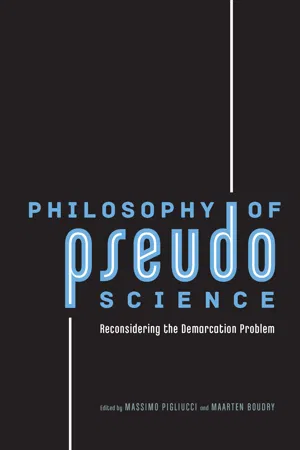
Philosophy of Pseudoscience
Reconsidering the Demarcation Problem
Massimo Pigliucci,Maarten Boudry
- English
- ePUB (handyfreundlich)
- Über iOS und Android verfügbar
Philosophy of Pseudoscience
Reconsidering the Demarcation Problem
Massimo Pigliucci,Maarten Boudry
Über dieses Buch
What sets the practice of rigorously tested, sound science apart from pseudoscience? In this volume, the contributors seek to answer this question, known to philosophers of science as "the demarcation problem." This issue has a long history in philosophy, stretching as far back as the early twentieth century and the work of Karl Popper. But by the late 1980s, scholars in the field began to treat the demarcation problem as impossible to solve and futile to ponder. However, the essays that Massimo Pigliucci and Maarten Boudry have assembled in this volume make a rousing case for the unequivocal importance of reflecting on the separation between pseudoscience and sound science. Moreover, the demarcation problem is not a purely theoretical dilemma of mere academic interest: it affects parents' decisions to vaccinate children and governments' willingness to adopt policies that prevent climate change. Pseudoscience often mimics science, using the superficial language and trappings of actual scientific research to seem more respectable. Even a well-informed public can be taken in by such questionable theories dressed up as science. Pseudoscientific beliefs compete with sound science on the health pages of newspapers for media coverage and in laboratories for research funding. Now more than ever the ability to separate genuine scientific findings from spurious ones is vital, and The Philosophy of Pseudoscience provides ground for philosophers, sociologists, historians, and laypeople to make decisions about what science is or isn't.
Häufig gestellte Fragen
Information
Inhaltsverzeichnis
- Cover
- Copyright
- Title Page
- Contents
- Introduction: Why the Demarcation Problem Matters
- Part I. What’s the Problem with the Demarcation Problem?
- Part II. History and Sociology of Pseudoscience
- Part III. The Borderlands between Science and Pseudoscience
- Part IV. Science and the Supernatural
- Part V. True Believers and Their Tactics
- Part VI. The Cognitive Roots of Pseudoscience
- Notes
- Contributors
- Index